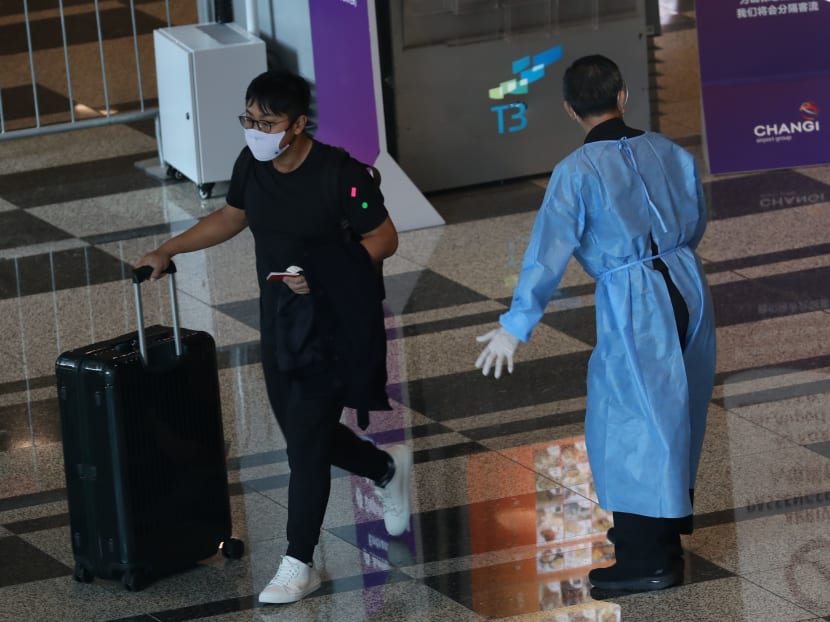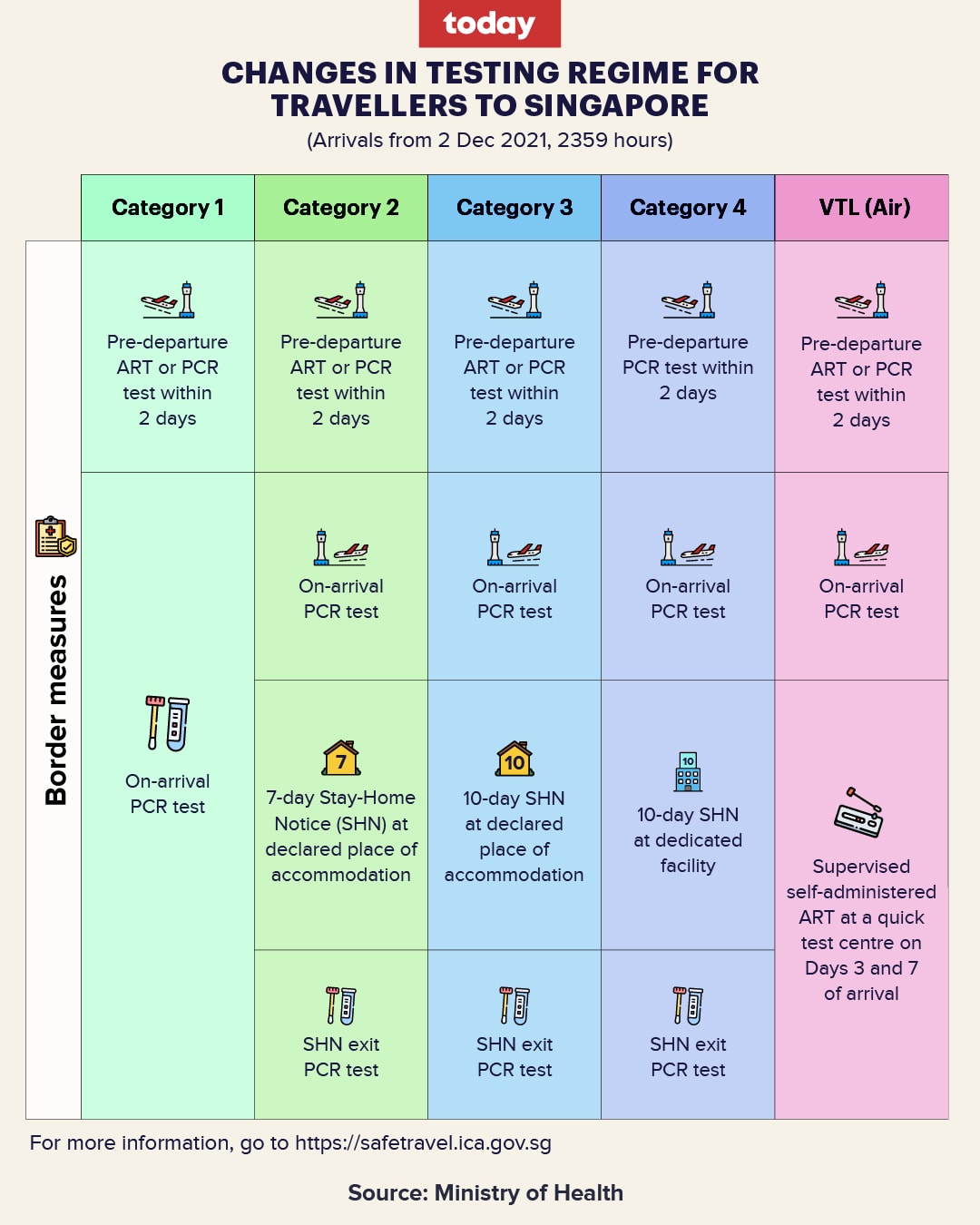Covid-19: More tests for VTL travellers arriving in S’pore among new border measures to contain Omicron risk
SINGAPORE — From 11.59pm on Thursday (Dec 2), travellers entering Singapore from higher-risk countries and regions must undergo a Covid-19 polymerase chain reaction (PCR) test on arrival.

A passenger arriving at Changi Airport Terminal 3 under the vaccinated travel lane scheme on Oct 19, 2021.
- Travellers entering Singapore from higher-risk countries and regions must undergo a PCR test on arrival
- Those arriving under the vaccinated travel lane scheme must take two more post-arrival tests
- Some airport and front-line border workers will return to taking a weekly rostered routine PCR test
- Confirmed or suspected Omicron cases will be taken to the National Centre for Infectious Diseases for isolation
SINGAPORE — From 11.59pm on Thursday (Dec 2), travellers entering Singapore from higher-risk countries and regions must undergo a Covid-19 polymerase chain reaction (PCR) test on arrival.
These include travellers entering the country from Category II countries that are not on the quarantine-free vaccinated travel lane (VTL) scheme, as well as those in Categories III and IV of Singapore's country- or region-specific classification of border controls.
Right now, these travellers need only take a pre-departure Covid-19 test before arriving in Singapore and a PCR test before the end of their seven-day or 10-day isolation.
This effectively means that all air travellers entering Singapore would be subject to a PCR test on arrival.
In the meantime, all vaccinated travellers coming here via the travel lane will have to take two extra Covid-19 antigen rapid tests on their third and seventh day of arrival, under supervision at a quick test centre.
The Ministry of Health (MOH) announced the extra testing requirements on Tuesday as part of several measures to contain the Omicron strain of the coronavirus.
MOH said that the extra testing requirements for travellers from these regions, as well as for those entering via the travel lane arrangement, would be in place for four weeks. The authorities will then review and extend these measures if needed.
While Singapore has not detected the potentially more infectious variant here so far, MOH said that the tightened controls would help the authorities quickly detect and isolate cases and reduce the risk of importation.
In response to the Omicron variant showing up in more countries, the Government also announced other measures to contain its spread at the country's borders and in the community.
These include:
-
All travellers from Category I regions, which have the lowest Covid-19 risk, who arrive in or transit through Singapore from 11.59pm on Thursday must test negative for Covid-19 through a pre-departure test done within two days before their departure. Places under Category I are mainland China, Hong Kong, Macau and Taiwan. Right now, such travellers need only take a PCR test on arrival
-
All travellers who arrived here between Nov 12 and 27, and were in regions affected by the Omicron variant in the 14 days before arrival, must take a PCR test
-
Airport and other front-line border workers who may come into contact with travellers from places affected by the Omicron variant must from Thursday take a weekly rostered routine PCR test
-
People confirmed or suspected to be infected with the Omicron strain would be barred from undergoing home recovery and instead be taken to the National Centre for Infectious Diseases for isolation and management
-
The authorities are advising Singapore residents to defer all travel to higher-risk countries or regions, including Botswana, Eswatini, Lesotho, Mozambique, Namibia, South Africa and Zimbabwe, until further notice
MOH said that separate measures would apply to vaccinated travellers from Malaysia entering via the travel lane scheme's land links, who take a pre-departure test and an antigen rapdi test after crossing the Causeway.
It said that Malaysia’s travel curbs on regions affected by the Omicron variant, and confining the travel lane only to vaccinated citizens, permanent residents and long-term pass holders of both countries in the present phase, would lower the risk of importation.
The ministry added that it would continue monitoring and evaluating data on the Omicron variant, and adjust border and community measures accordingly.
“We seek Singaporeans’ understanding and support in the coming weeks as calibration to our measures may need to be introduced quickly, given the fluidity of the situation,” the ministry said.
The World Health Organization has listed Omicron as a "variant of concern" and countries across the globe are restricting travel from southern Africa, where the new strain first emerged, and taking other fresh precautions.
On Oct 23, Singapore removed the on-arrival test requirement for travellers from Category II regions as well as those from Categories III and IV who are not on the quarantine-free travel lane.
This was part of an effort to simplify testing protocols so that travellers would need to take only one PCR test after arrival here.
On the same day, Health Minister Ong Ye Kung said during a news conference by the national Covid-19 task force that strict border controls were “no longer very relevant” as Singapore moves to living with Covid-19.
He said then that virus transmission rates in many countries had stabilised and, in some cases, were even lower than in Singapore. This was well before the Omicron variant of concern emerged.
TESTING FOR FRONT-LINE BORDER WORKERS
Aircrew serving flights from regions hit by the Omicron variant would be subject to an on-arrival PCR test and to post-arrival PCR tests on the third and seventh days after each flight duty.
Other airport and front-line border workers will continue with rostered routine testing using antigen rapid tests.
As an added precaution, workers who test positive for the rapid test must go for a PCR test to confirm the infection.
All front-line border workers, including recovered Covid-19 patients, must undergo the rostered testing.
COMPREHENSIVE CONTACT TRACING
The authorities will conduct full contact tracing for people suspected or confirmed to be infected with the Omicron variant, in order to identify their close contacts.
These close contacts will be quarantined for 10 days at designated facilities instead of being allowed to self-isolate at home.
They will take a PCR test at the start and end of their quarantine.
UPDATED TRAVEL ADVISORY
For travellers who visit places with cases of the Omicron variant, or countries with high traffic volume to these higher-risk countries or regions, they are advised to take extra precautions.
These include wearing face masks as well as observing good personal hygiene and infection controls, even if these precautions are not required there.









